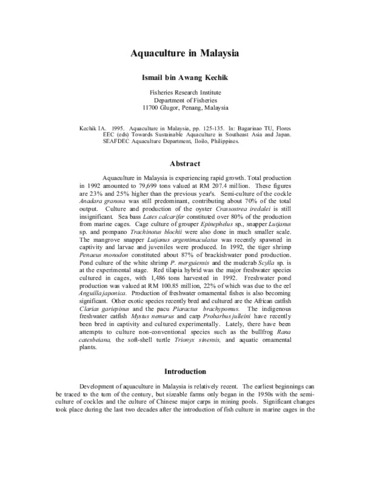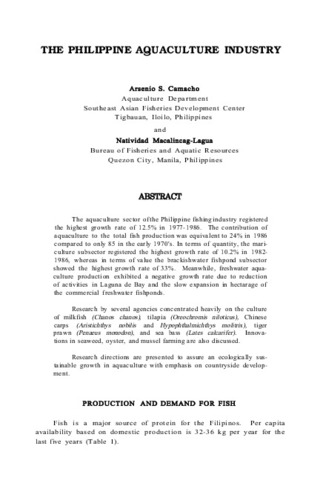Demonstration of tilapia-carp polyculture in lowland and highland farms
| dc.contributor.author | Palma, Adelaida L. | |
| dc.contributor.author | Pol, Romy M. | |
| dc.contributor.author | Diamante, Adan Samuel | |
| dc.contributor.editor | Bagarinao, Teodora | |
| dc.date.accessioned | 2018-05-29T08:38:26Z | |
| dc.date.available | 2018-05-29T08:38:26Z | |
| dc.date.issued | 2007 | |
| dc.identifier.citation | Palma, A. L., Pol, R. M., & Diamante, A. S. (2007). Demonstration of tilapia-carp polyculture in lowland and highland farms. In T. U. Bagarinao (Ed.), Research Output of the Fisheries Sector Program (Vol. 2. Reports on Fisheries and Aquaculture, pp. 152-154). Quezon City, Philippines: Bureau of Agricultural Research, Department of Agriculture. | en |
| dc.identifier.isbn | 9718511776 | |
| dc.identifier.uri | http://hdl.handle.net/10862/3300 | |
| dc.description.abstract | Technology demonstration was conducted in three selected lowland freshwater ponds in Lucban, Quezon and in three highland ponds in Ifugao. The ponds varied in location, size, water source, and operators. The polyculture system included 60% Nile tilapia, 30% common carp, and 10% bighead carp, seeded at a density of 5/m2. Two lowland ponds had total production of 4,737 and 4,416 kg/ha-yr (8.83 kg/m3 and 6.77 kg/m3). One highland pond yielded 2,786 kg/ha-yr (11.14 kg/m3). Survival rates were better in lowland areas, mostly because the farmer cooperators had better training and more experience. Costs-and-returns analysis showed high profitability of tilapia-carp polyculture. With proper management, polyculture can produce fish and increase farmers‘ incomes, even during the off-season for traditional crops. | en |
| dc.language.iso | en | en |
| dc.publisher | Bureau of Agricultural Research, Department of Agriculture | en |
| dc.subject | tilapia | en |
| dc.subject | carp | en |
| dc.subject | Philippines | en |
| dc.subject | Oreochromis niloticus | en |
| dc.subject | Cyprinus carpio | en |
| dc.title | Demonstration of tilapia-carp polyculture in lowland and highland farms | en |
| dc.type | Book chapter | en |
| dc.citation.spage | 152 | |
| dc.citation.epage | 154 | |
| dc.citation.bookTitle | Research Output of the Fisheries Sector Program | en |
| dc.subject.asfa | polyculture (aquaculture) | en |
| dc.subject.asfa | pond culture | en |
| dc.subject.asfa | freshwater aquaculture | en |
| dc.subject.asfa | experimental culture | en |
| dc.subject.asfa | returns | en |
| dc.subject.asfa | fish culture | en |
| dc.subject.asfa | technology transfer | en |
| dc.subject.asfa | aquaculture | en |
| dc.subject.asfa | stocking density | en |
| dc.subject.scientificName | Hypophthalmichthys nobilis |
Files in this item
| Files | Size | Format | View |
|---|---|---|---|
|
There are no files associated with this item. |
|||



